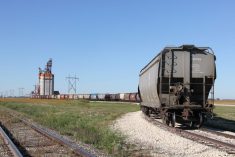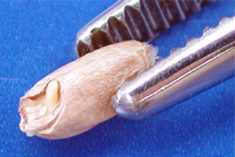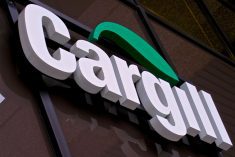Off-and-on talks toward a new ownership group for the Hudson Bay Railway have produced a deal, which it’s hoped will lead to the line’s repair before this winter, federal officials announced Friday.
Federal Trade Diversification Minister Jim Carr and Northern Affairs Minister Dominic LeBlanc announced the Arctic Gateway Group Limited Partnership has bought the Hudson Bay Rail Co., the Hudson Bay Port Co. and the Churchill Marine Tank Farm from U.S. shortline company OmniTrax for an undisclosed sum.
The Arctic Gateway Group is a private/public partnership including the northern communities’ consortium Missinippi Rail Ltd. Partnership, Toronto investment firm Fairfax Financial Holdings and AGT Limited Partnership, an arm of Regina pulse crop processor AGT.
Read Also

Pea, lentil outlooks have some positive signals – Penner
As pulse growers consider what to plant this spring, Chuck Penner of Leftfield Commodities Research said there is some optimism in the Canadian pulse market. Penner gave a presentation at the Saskatchewan Pulse Growers meeting in Swift Current on Feb. 4.
The Hudson Bay rail line, which runs from the northwestern Manitoba communities of The Pas and Flin Flon northeast through Thompson to the Port of Churchill, Man. on Hudson Bay, hasn’t operated since May 2017, following flooding and washouts along the stretch between Amery (about 45 km northeast of Gillam) and Churchill.
The railway’s operator declared force majeure and an indefinite suspension of operations on the line on June 9 last year, later saying repairs would cost as much as US$60 million and it wasn’t prepared to pay without government assistance.
The Canadian Transportation Agency (CTA) in June this year ordered the Hudson Bay Rail Co. to get repair work underway by July 3 at the latest.
In response to statements from HBR that actual repairs wouldn’t begin without a cash infusion — either from proceeds of a sale of the business, or from federal funding — the CTA on Aug. 21 issued a “show cause” order. It required the company to show by Aug. 27 why the agency shouldn’t find HBR had failed to comply with the June order.
HBR had been in talks toward a sale earlier this spring, resulting in what the federal government described in late May as an agreement in principle, but HBR announced July 3 that its “transaction has fallen apart,” then announced a week later that negotiations with the proposed consortium had “resumed.”
Government officials on Friday said “construction crews have been mobilized” and work would begin “immediately” and repairs, adding “all efforts will be made to restore the rail service before winter 2018.”
In the meantime, the government said, “community support programs for food, fuel and economic development will remain in place until rail service resumes.”
“All those involved agree that this generational project has the potential to create northern jobs as well as ensure that northern communities have the goods and supplies they require, while at the same time restoring and increasing trade and export capacity for natural resources and agricultural commodities through a north gateway,” Paul Rivett, director of the Arctic Gateway Group, said in Friday’s release.
The group’s partners, he said, “are committed to working with the government of Canada, provinces and the private sector to build an Arctic gateway for Canada to the world.”
Financial terms of the group’s deal were not released Friday.
Phase one of the project, Rivett said, “will be to repair the rail line (and) undertake safety and rehabilitation upgrades to the port and the railway assets.”
The group, he said, will “do all we can to restore service expeditiously and safely,” but added “we are racing against time. We will immediately begin our work to make the broader project also a reality.”
“We are hopeful the repair of the rail line can occur as soon as possible so that service can be resumed before freeze-up,” Manitoba Premier Brian Pallister said in a separate statement Friday.
“However, we want to reassure the people of Churchill and the surrounding northern communities that we have already made the financial commitments and logistical arrangements necessary to ensure propane resupply for the winter.”
The rail line, completed in 1929, and the port facility, built by 1931, were set up to serve northern communities and provide an alternate shipping route into and out of Western and central Canada.
Restoring the line in time for winter would allow freight traffic such as food, fuel and other goods to resume to Churchill and other communities near the line, but a deal comes too late to allow Prairie grain exports out of Churchill during the 2018 shipping season.
From an export perspective, railing grain from certain areas of Saskatchewan and Manitoba up and out through Churchill, rather than east to Thunder Bay, is believed to shave up to three days off voyages to some ports in Western Europe.
But Churchill’s grain handle declined in the five years after the deregulation of its main customer, the Canadian Wheat Board. OmniTrax shut down the port facility and laid off its staff before the 2016 grain shipping season.
The port’s ice-limited shipping season, typically July through October, has been a benefactor of global warming in recent years, but warmer weather also makes the rail line, much of which is built on permafrost, less stable.
Denver-based OmniTrax had bought the government-owned port and Canadian National Railway’s (CN) rail line from The Pas to Churchill in 1997. The federal government has said its funding commitments in a 2008 agreement with OmniTrax called for the company to maintain and operate rail service through to Churchill until 2029. — Glacier FarmMedia Network
















